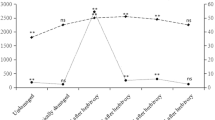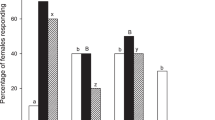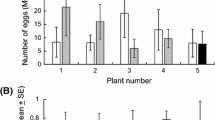Abstract
It has been suggested that herbivore would react to volatiles produced by herbivore infested plant due to potential change, either positive or negative, in the acceptability of the host plant. This hypothesis was tested for the brown planthopper (BPH) in the laboratory. Sixteen components of the headspace volatiles from rice seedlings with different treatments were collected with SPME and Tenax-TA trap and analyzed with GC and GC-MS. Significant differences in volatile emissions were observed for rice plants with different treatments. Undamaged control plants, mechanically damaged plants and the plants infested by BPH for 1 or 2 d emitted much lower amounts of volatiles compared to the plants infested by BPH for 3 or 5 d. The plants infested by BPH for 3 or 5 d emitted several volatiles that were not detected in undamaged control plants, mechanically damaged plants or the plants infested by BPH for 1 or 2 d. Spodoptera litura infested plants released much higher amounts of volatiles than those in all other treatments, and the contents of several green leaf volatiles, methyl salicylate and terpenoids increased dramatically. In dual-choice flight tunnel experiments, adult BPH females showed no significant preference between the untreated healthy plants and mechanically damaged plants or the plants infested by BPH adult females. However, rice plants damaged by S. litura had a clearly repellent effects on BPH adult females compared to healthy undamaged plants, mechanically damaged plants or the plants infested by BPH.
Similar content being viewed by others
References
Turlings, T. C. J., Tumlinson, J. H., Lewis, W. J., Exploitation of herbivore induced plant odors by host seeking parasitic wasps, Science, 1990, 250: 1251.
Turlings, T. C. J., Loughrin, J. H., McCall, P. J. et al., How caterpillar-damaged plants protect themselves by attracting parasitic wasps, Proc. Natl. Acad. Sci. USA, 1995, 92: 4169.
Dicke, M., Chemical ecology of host-plant selection by herbivorous arthropods: a multitrophic perspective, Biochem. Syst. Ecol., 2000, 28: 601.
Dicke, M., van Loon, J. J. A., Multitrophic effects of herbivore-induced plant volatiles in an evolutionary context, Entomol. Exp. Appl., 2000, 97: 237.
Keßler, A., Baldwin, I. T., Defensive function of herbivore-induced plant volatile emissions in nature, Science, 2001, 292: 2141.
Lou, Y. G., Cheng, J. A., Herbivore-induced plant volatiles: primary characteristics, ecological functions and its release mechanism, Acta Ecologica Sinica (in Chinese), 2000, 20(6): 1097.
Zhang, Y., Yan, F. S., Herbivore-induced volatiles and their roles in plant defense, Entomologica Sinica (in Chinese), 1998, 41(2): 204.
Xu, N., Chen, Z. M., You, X. Q., Isolation and identification of tea plant volatiles attractive to tea geometrid parasitoids, Acta Entomologica Sinica (in Chinese), 1999, 42(2): 126.
Han, B. Y., Zhang, Z. N., Fang, Y. L., Electrophysiology and behavior feedback of diamondback moth, Plutella xylostella, to volatile secondary metabolites emitted by Chinese cabbage, Chinese Science Bulletin, 2001, 46: 2086.
Kan, F., Zhang, F., Zhang, Z. N., Behavior-modulating plant volatile chemical for aphids, Chinese Science Bulletin, 2002, 47: 115.
Bernasconi, M. L., Turlings, T. C. J., Ambrosetti, L. et al., Herbivore-induced emissions of maize volatiles repel the corn leaf aphid, Rhopalosiphum maidis, Entomol. Exp. Appl., 1998, 87: 133.
De Moraes, C. M., Mescher, M. C., Tumlinson, J. H., Caterpillar-induced nocturnal plant volatiles repel conspecific females, Nature, 2001, 410: 577.
Turlings, T. C. J., Bernasconi, M., Bertossa, R. et al., The induction of volatiles emissions in maize by three herbivore species with different feeding habits: possible consequences for their natural enemies, Biological Control, 1998, 11: 122.
Lou, Y. G., Cheng, J. A., Behavior response of Angrus nilaparvatae Pang et Wang to the volatile of rice varieties, Entomological Journal of East China (in Chinese), 1996, 5(1): 60.
Rapusas, H. R., Bottrell, D. G., Coll, M., Intraspecific variation in chemical attraction of rice to insect predators, Biological Control, 1996, 6: 394.
Alborn, H. T., Turlings, T. C. J., Jone, T. H. et al., An elicitor of volatile from beet armyworm oral secretion, Science, 1997, 276: 945.
Halitschke, R., Schittko, U., Pohnert, G. et al., Molecular interactions between the specialist herbivore Manduca sexta (Lepidoptera, Sphingidae) and its natural host Nicotiana attenuata. III. Fatty acid-amino acid conjugates in herbivore oral secretions are necessary and sufficient for herbivore-specific plant responses, Plant Physiol., 2001, 125: 711.
Zhang, G. R., Lian, B., Gu, L. Q. et al., Effects of ethanol extracts from susceptible and resistant rice varieties on brown planthopper, Nilaparvata lugens (Stål) (Homoptera: Delphicidae), Acta Entomologica Sinica (in Chinese), 41: 215.
Zhang, G. R., Zhang, W. Q., Lian, B. et al., Insecticidal effects of extracts from two rice varieties to brown planthopper, J. Chem. Ecol., 1999, 25: 1843.
Parè, P. W., Tumlinson, J. H., Induced synthesis of plant volatiles, Nature, 1997, 385: 30.
Mattiacci, L., Dicke, M., Posthumus, M. A. et al., β-Glucosidase: an elicitor of herbivore-induced plant odor that attracts hostseeking parasitic wasps, Proc. Natl. Acad. Sci. USA, 1995, 92: 2036.
Author information
Authors and Affiliations
Corresponding author
About this article
Cite this article
Xu, T., Zhou, Q., Xia, Q. et al. Effects of herbivore-induced rice volatiles on the host selection behavior of brown planthopper, Nilaparvata lugens . Chin. Sci. Bull. 47, 1355–1360 (2002). https://doi.org/10.1360/02tb9300
Received:
Issue Date:
DOI: https://doi.org/10.1360/02tb9300




